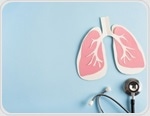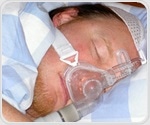| Study explores the link between sleep apnea and brain volume |
|
|
|
|
| |
|
| |
The latest pulmonology news from News Medical |
|
|
|
| |  | | |  A little-known bacterium -; a distant cousin of the microbes that cause tuberculosis and leprosy -; is emerging as a public health threat capable of causing severe lung infections among vulnerable populations, those with compromised immunity or reduced lung function. A little-known bacterium -; a distant cousin of the microbes that cause tuberculosis and leprosy -; is emerging as a public health threat capable of causing severe lung infections among vulnerable populations, those with compromised immunity or reduced lung function. | | | | |  Researchers determined the prevalence of nontuberculous mycobacterial pulmonary disease (NTM-PD) in 2020. Researchers determined the prevalence of nontuberculous mycobacterial pulmonary disease (NTM-PD) in 2020. | | | | |  Researchers reported on the treatment of rifampin-resistant tuberculosis in the United States using the FDA approved bedaquiline, pretomanid, and linezolid (BPaL) therapy. Researchers reported on the treatment of rifampin-resistant tuberculosis in the United States using the FDA approved bedaquiline, pretomanid, and linezolid (BPaL) therapy. | | | | |  Newborn babies who experience low levels of oxygen in their body tissues (hypoxia) due to sleep apnea, for example, tend to develop respiratory problems and hypertension (high blood pressure) in adulthood, and these problems may persist for the rest of their lives. Newborn babies who experience low levels of oxygen in their body tissues (hypoxia) due to sleep apnea, for example, tend to develop respiratory problems and hypertension (high blood pressure) in adulthood, and these problems may persist for the rest of their lives. | | | | |  Researchers at the University of Louisville have received $5.8 million in two grants from the National Institutes of Health to expand their work to better understand and prevent immune system dysregulation responsible for acute respiratory distress, the condition responsible for serious illness and death in some COVID-19 patients. Researchers at the University of Louisville have received $5.8 million in two grants from the National Institutes of Health to expand their work to better understand and prevent immune system dysregulation responsible for acute respiratory distress, the condition responsible for serious illness and death in some COVID-19 patients. | |
|
|
|
|
|
|
|